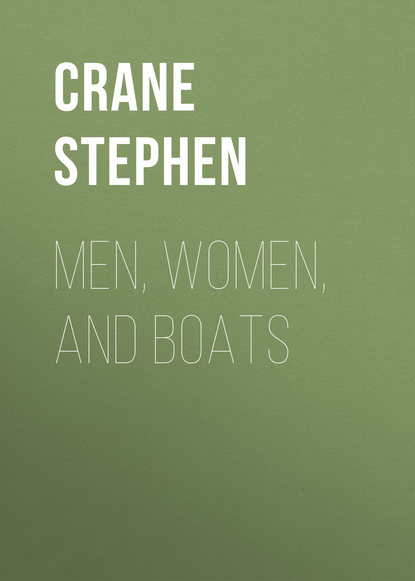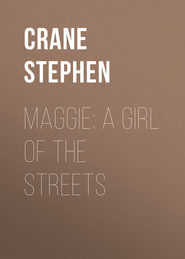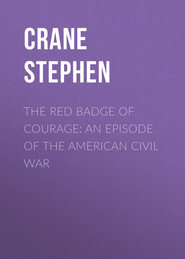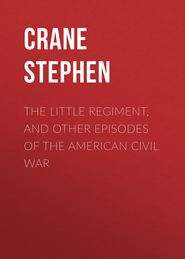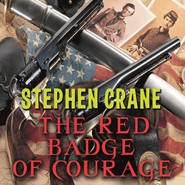По всем вопросам обращайтесь на: info@litportal.ru
(©) 2003-2025.
✖
Men, Women, and Boats
Автор
Год написания книги
2018
Настройки чтения
Размер шрифта
Высота строк
Поля
"Oh, you were, indeed?" she said with a great air.
For a few minutes she was so haughty with him that he loved her to madness. And directly this poem, which stuck at his lips, came forth lamely in fragments.
When they walked back toward the other girl and saw the patience of her attitude, their hearts swelled in a patronizing and secondary tenderness for her.
They were very happy. If they had been miserable they would have charged this fairy scene of the night with a criminal heartlessness; but as they were joyous, they vaguely wondered how the purple sea, the yellow stars, the changing crowds under the electric lights could be so phlegmatic and stolid.
They walked home by the lakeside way, and out upon the water those gay paper lanterns, flashing, fleeting, and careering, sang to them, sang a chorus of red and violet, and green and gold; a song of mystic bands of the future.
One day, when business paused during a dull sultry afternoon, Stimson went up town. Upon his return, he found that the popcorn man, from his stand over in a corner, was keeping an eye upon the cashier's cage, and that nobody at all was attending to the wooden arm and the iron rings. He strode forward like a sergeant of grenadiers.
"Where in thunder is Lizzie?" he demanded, a cloud of rage in his eyes.
The popcorn man, although associated long with Stimson, had never got over being dazed.
"They've—they've—gone round to th'—th'—house," he said with difficulty, as if he had just been stunned.
"Whose house?" snapped Stimson.
"Your—your house, I s'pose," said the popcorn man.
Stimson marched round to his home. Kingly denunciations surged, already formulated, to the tip of his tongue, and he bided the moment when his anger could fall upon the heads of that pair of children. He found his wife convulsive and in tears.
"Where's Lizzie?"
And then she burst forth—"Oh—John—John—they've run away, I know they have. They drove by here not three minutes ago. They must have done it on purpose to bid me good-bye, for Lizzie waved her hand sadlike; and then, before I could get out to ask where they were going or what, Frank whipped up the horse."
Stimson gave vent to a dreadful roar.
"Get my revolver—get a hack—get my revolver, do you hear—what the devil—" His voice became incoherent.
He had always ordered his wife about as if she were a battalion of infantry, and despite her misery, the training of years forced her to spring mechanically to obey; but suddenly she turned to him with a shrill appeal.
"Oh, John—not—the—revolver."
"Confound it, let go of me!" he roared again, and shook her from him.
He ran hatless upon the street. There were a multitude of hacks at the summer resort, but it was ages to him before he could find one. Then he charged it like a bull.
"Uptown!" he yelled, as he tumbled into the rear seat.
The hackman thought of severed arteries. His galloping horse distanced a large number of citizens who had been running to find what caused such contortions by the little hatless man.
It chanced as the bouncing hack went along near the lake, Stimson gazed across the calm grey expanse and recognized a color in a bonnet and a pose of a head. A buggy was traveling along a highway that led to Sorington. Stimson bellowed—"There—there—there they are—in that buggy."
The hackman became inspired with the full knowledge of the situation. He struck a delirious blow with the whip. His mouth expanded in a grin of excitement and joy. It came to pass that this old vehicle, with its drowsy horse and its dusty-eyed and tranquil driver, seemed suddenly to awaken, to become animated and fleet. The horse ceased to ruminate on his state, his air of reflection vanished. He became intent upon his aged legs and spread them in quaint and ridiculous devices for speed. The driver, his eyes shining, sat critically in his seat. He watched each motion of this rattling machine down before him. He resembled an engineer. He used the whip with judgment and deliberation as the engineer would have used coal or oil. The horse clacked swiftly upon the macadam, the wheels hummed, the body of the vehicle wheezed and groaned.
Stimson, in the rear seat, was erect in that impassive attitude that comes sometimes to the furious man when he is obliged to leave the battle to others. Frequently, however, the tempest in his breast came to his face and he howled—
"Go it—go it—you're gaining; pound 'im! Thump the life out of 'im; hit 'im hard, you fool!" His hand grasped the rod that supported the carriage top, and it was clenched so that the nails were faintly blue.
Ahead, that other carriage had been flying with speed, as from realization of the menace in the rear. It bowled away rapidly, drawn by the eager spirit of a young and modern horse. Stimson could see the buggy-top bobbing, bobbing. That little pane, like an eye, was a derision to him. Once he leaned forward and bawled angry sentences. He began to feel impotent; his whole expedition was a tottering of an old man upon a trail of birds. A sense of age made him choke again with wrath. That other vehicle, that was youth, with youth's pace; it was swift-flying with the hope of dreams. He began to comprehend those two children ahead of him, and he knew a sudden and strange awe, because he understood the power of their young blood, the power to fly strongly into the future and feel and hope again, even at that time when his bones must be laid in the earth. The dust rose easily from the hot road and stifled the nostrils of Stimson.
The highway vanished far away in a point with a suggestion of intolerable length. The other vehicle was becoming so small that Stimson could no longer see the derisive eye.
At last the hackman drew rein to his horse and turned to look at Stimson.
"No use, I guess," he said.
Stimson made a gesture of acquiescence, rage, despair. As the hackman turned his dripping horse about, Stimson sank back with the astonishment and grief of a man who has been defied by the universe. He had been in a great perspiration, and now his bald head felt cool and uncomfortable. He put up his hand with a sudden recollection that he had forgotten his hat.
At last he made a gesture. It meant that at any rate he was not responsible.
A TENT IN AGONY
A SULLIVAN COUNTY TALE
Four men once came to a wet place in the roadless forest to fish. They pitched their tent fair upon the brow of a pine-clothed ridge of riven rocks whence a bowlder could be made to crash through the brush and whirl past the trees to the lake below. On fragrant hemlock boughs they slept the sleep of unsuccessful fishermen, for upon the lake alternately the sun made them lazy and the rain made them wet. Finally they ate the last bit of bacon and smoked and burned the last fearful and wonderful hoecake.
Immediately a little man volunteered to stay and hold the camp while the remaining three should go the Sullivan county miles to a farmhouse for supplies. They gazed at him dismally. "There's only one of you—the devil make a twin," they said in parting malediction, and disappeared down the hill in the known direction of a distant cabin. When it came night and the hemlocks began to sob they had not returned. The little man sat close to his companion, the campfire, and encouraged it with logs. He puffed fiercely at a heavy built brier, and regarded a thousand shadows which were about to assault him. Suddenly he heard the approach of the unknown, crackling the twigs and rustling the dead leaves. The little man arose slowly to his feet, his clothes refused to fit his back, his pipe dropped from his mouth, his knees smote each other. "Hah!" he bellowed hoarsely in menace. A growl replied and a bear paced into the light of the fire. The little man supported himself upon a sapling and regarded his visitor.
The bear was evidently a veteran and a fighter, for the black of his coat had become tawny with age. There was confidence in his gait and arrogance in his small, twinkling eye. He rolled back his lips and disclosed his white teeth. The fire magnified the red of his mouth. The little man had never before confronted the terrible and he could not wrest it from his breast. "Hah!" he roared. The bear interpreted this as the challenge of a gladiator. He approached warily. As he came near, the boots of fear were suddenly upon the little man's feet. He cried out and then darted around the campfire. "Ho!" said the bear to himself, "this thing won't fight—it runs. Well, suppose I catch it." So upon his features there fixed the animal look of going—somewhere. He started intensely around the campfire. The little man shrieked and ran furiously. Twice around they went.
The hand of heaven sometimes falls heavily upon the righteous. The bear gained.
In desperation the little man flew into the tent. The bear stopped and sniffed at the entrance. He scented the scent of many men. Finally he ventured in.
The little man crouched in a distant corner. The bear advanced, creeping, his blood burning, his hair erect, his jowls dripping. The little man yelled and rustled clumsily under the flap at the end of the tent. The bear snarled awfully and made a jump and a grab at his disappearing game. The little man, now without the tent, felt a tremendous paw grab his coat tails. He squirmed and wriggled out of his coat like a schoolboy in the hands of an avenger. The bear bowled triumphantly and jerked the coat into the tent and took two bites, a punch and a hug before he, discovered his man was not in it. Then he grew not very angry, for a bear on a spree is not a black-haired pirate. He is merely a hoodlum. He lay down on his back, took the coat on his four paws and began to play uproariously with it. The most appalling, blood-curdling whoops and yells came to where the little man was crying in a treetop and froze his blood. He moaned a little speech meant for a prayer and clung convulsively to the bending branches. He gazed with tearful wistfulness at where his comrade, the campfire, was giving dying flickers and crackles. Finally, there was a roar from the tent which eclipsed all roars; a snarl which it seemed would shake the stolid silence of the mountain and cause it to shrug its granite shoulders. The little man quaked and shrivelled to a grip and a pair of eyes. In the glow of the embers he saw the white tent quiver and fall with a crash. The bear's merry play had disturbed the center pole and brought a chaos of canvas upon his head.
Now the little man became the witness of a mighty scene. The tent began to flounder. It took flopping strides in the direction of the lake. Marvellous sounds came from within—rips and tears, and great groans and pants. The little man went into giggling hysterics.
The entangled monster failed to extricate himself before he had walloped the tent frenziedly to the edge of the mountain. So it came to pass that three men, clambering up the hill with bundles and baskets, saw their tent approaching. It seemed to them like a white-robed phantom pursued by hornets. Its moans riffled the hemlock twigs.
The three men dropped their bundles and scurried to one side, their eyes gleaming with fear. The canvas avalanche swept past them. They leaned, faint and dumb, against trees and listened, their blood stagnant. Below them it struck the base of a great pine tree, where it writhed and struggled. The three watched its convolutions a moment and then started terrifically for the top of the hill. As they disappeared, the bear cut loose with a mighty effort. He cast one dishevelled and agonized look at the white thing, and then started wildly for the inner recesses of the forest.
The three fear-stricken individuals ran to the rebuilt fire. The little man reposed by it calmly smoking. They sprang at him and overwhelmed him with interrogations. He contemplated darkness and took a long, pompous puff. "There's only one of me—and the devil made a twin," he said.
FOUR MEN IN A CAVE
LIKEWISE FOUR QUEENS, AND A SULLIVAN COUNTY HERMIT
The moon rested for a moment on the top of a tall pine on a hill.
The little man was standing in front of the campfire making orations to his companions.
"We can tell a great tale when we get back to the city if we investigate this thing," said he, in conclusion.
They were won.
For a few minutes she was so haughty with him that he loved her to madness. And directly this poem, which stuck at his lips, came forth lamely in fragments.
When they walked back toward the other girl and saw the patience of her attitude, their hearts swelled in a patronizing and secondary tenderness for her.
They were very happy. If they had been miserable they would have charged this fairy scene of the night with a criminal heartlessness; but as they were joyous, they vaguely wondered how the purple sea, the yellow stars, the changing crowds under the electric lights could be so phlegmatic and stolid.
They walked home by the lakeside way, and out upon the water those gay paper lanterns, flashing, fleeting, and careering, sang to them, sang a chorus of red and violet, and green and gold; a song of mystic bands of the future.
One day, when business paused during a dull sultry afternoon, Stimson went up town. Upon his return, he found that the popcorn man, from his stand over in a corner, was keeping an eye upon the cashier's cage, and that nobody at all was attending to the wooden arm and the iron rings. He strode forward like a sergeant of grenadiers.
"Where in thunder is Lizzie?" he demanded, a cloud of rage in his eyes.
The popcorn man, although associated long with Stimson, had never got over being dazed.
"They've—they've—gone round to th'—th'—house," he said with difficulty, as if he had just been stunned.
"Whose house?" snapped Stimson.
"Your—your house, I s'pose," said the popcorn man.
Stimson marched round to his home. Kingly denunciations surged, already formulated, to the tip of his tongue, and he bided the moment when his anger could fall upon the heads of that pair of children. He found his wife convulsive and in tears.
"Where's Lizzie?"
And then she burst forth—"Oh—John—John—they've run away, I know they have. They drove by here not three minutes ago. They must have done it on purpose to bid me good-bye, for Lizzie waved her hand sadlike; and then, before I could get out to ask where they were going or what, Frank whipped up the horse."
Stimson gave vent to a dreadful roar.
"Get my revolver—get a hack—get my revolver, do you hear—what the devil—" His voice became incoherent.
He had always ordered his wife about as if she were a battalion of infantry, and despite her misery, the training of years forced her to spring mechanically to obey; but suddenly she turned to him with a shrill appeal.
"Oh, John—not—the—revolver."
"Confound it, let go of me!" he roared again, and shook her from him.
He ran hatless upon the street. There were a multitude of hacks at the summer resort, but it was ages to him before he could find one. Then he charged it like a bull.
"Uptown!" he yelled, as he tumbled into the rear seat.
The hackman thought of severed arteries. His galloping horse distanced a large number of citizens who had been running to find what caused such contortions by the little hatless man.
It chanced as the bouncing hack went along near the lake, Stimson gazed across the calm grey expanse and recognized a color in a bonnet and a pose of a head. A buggy was traveling along a highway that led to Sorington. Stimson bellowed—"There—there—there they are—in that buggy."
The hackman became inspired with the full knowledge of the situation. He struck a delirious blow with the whip. His mouth expanded in a grin of excitement and joy. It came to pass that this old vehicle, with its drowsy horse and its dusty-eyed and tranquil driver, seemed suddenly to awaken, to become animated and fleet. The horse ceased to ruminate on his state, his air of reflection vanished. He became intent upon his aged legs and spread them in quaint and ridiculous devices for speed. The driver, his eyes shining, sat critically in his seat. He watched each motion of this rattling machine down before him. He resembled an engineer. He used the whip with judgment and deliberation as the engineer would have used coal or oil. The horse clacked swiftly upon the macadam, the wheels hummed, the body of the vehicle wheezed and groaned.
Stimson, in the rear seat, was erect in that impassive attitude that comes sometimes to the furious man when he is obliged to leave the battle to others. Frequently, however, the tempest in his breast came to his face and he howled—
"Go it—go it—you're gaining; pound 'im! Thump the life out of 'im; hit 'im hard, you fool!" His hand grasped the rod that supported the carriage top, and it was clenched so that the nails were faintly blue.
Ahead, that other carriage had been flying with speed, as from realization of the menace in the rear. It bowled away rapidly, drawn by the eager spirit of a young and modern horse. Stimson could see the buggy-top bobbing, bobbing. That little pane, like an eye, was a derision to him. Once he leaned forward and bawled angry sentences. He began to feel impotent; his whole expedition was a tottering of an old man upon a trail of birds. A sense of age made him choke again with wrath. That other vehicle, that was youth, with youth's pace; it was swift-flying with the hope of dreams. He began to comprehend those two children ahead of him, and he knew a sudden and strange awe, because he understood the power of their young blood, the power to fly strongly into the future and feel and hope again, even at that time when his bones must be laid in the earth. The dust rose easily from the hot road and stifled the nostrils of Stimson.
The highway vanished far away in a point with a suggestion of intolerable length. The other vehicle was becoming so small that Stimson could no longer see the derisive eye.
At last the hackman drew rein to his horse and turned to look at Stimson.
"No use, I guess," he said.
Stimson made a gesture of acquiescence, rage, despair. As the hackman turned his dripping horse about, Stimson sank back with the astonishment and grief of a man who has been defied by the universe. He had been in a great perspiration, and now his bald head felt cool and uncomfortable. He put up his hand with a sudden recollection that he had forgotten his hat.
At last he made a gesture. It meant that at any rate he was not responsible.
A TENT IN AGONY
A SULLIVAN COUNTY TALE
Four men once came to a wet place in the roadless forest to fish. They pitched their tent fair upon the brow of a pine-clothed ridge of riven rocks whence a bowlder could be made to crash through the brush and whirl past the trees to the lake below. On fragrant hemlock boughs they slept the sleep of unsuccessful fishermen, for upon the lake alternately the sun made them lazy and the rain made them wet. Finally they ate the last bit of bacon and smoked and burned the last fearful and wonderful hoecake.
Immediately a little man volunteered to stay and hold the camp while the remaining three should go the Sullivan county miles to a farmhouse for supplies. They gazed at him dismally. "There's only one of you—the devil make a twin," they said in parting malediction, and disappeared down the hill in the known direction of a distant cabin. When it came night and the hemlocks began to sob they had not returned. The little man sat close to his companion, the campfire, and encouraged it with logs. He puffed fiercely at a heavy built brier, and regarded a thousand shadows which were about to assault him. Suddenly he heard the approach of the unknown, crackling the twigs and rustling the dead leaves. The little man arose slowly to his feet, his clothes refused to fit his back, his pipe dropped from his mouth, his knees smote each other. "Hah!" he bellowed hoarsely in menace. A growl replied and a bear paced into the light of the fire. The little man supported himself upon a sapling and regarded his visitor.
The bear was evidently a veteran and a fighter, for the black of his coat had become tawny with age. There was confidence in his gait and arrogance in his small, twinkling eye. He rolled back his lips and disclosed his white teeth. The fire magnified the red of his mouth. The little man had never before confronted the terrible and he could not wrest it from his breast. "Hah!" he roared. The bear interpreted this as the challenge of a gladiator. He approached warily. As he came near, the boots of fear were suddenly upon the little man's feet. He cried out and then darted around the campfire. "Ho!" said the bear to himself, "this thing won't fight—it runs. Well, suppose I catch it." So upon his features there fixed the animal look of going—somewhere. He started intensely around the campfire. The little man shrieked and ran furiously. Twice around they went.
The hand of heaven sometimes falls heavily upon the righteous. The bear gained.
In desperation the little man flew into the tent. The bear stopped and sniffed at the entrance. He scented the scent of many men. Finally he ventured in.
The little man crouched in a distant corner. The bear advanced, creeping, his blood burning, his hair erect, his jowls dripping. The little man yelled and rustled clumsily under the flap at the end of the tent. The bear snarled awfully and made a jump and a grab at his disappearing game. The little man, now without the tent, felt a tremendous paw grab his coat tails. He squirmed and wriggled out of his coat like a schoolboy in the hands of an avenger. The bear bowled triumphantly and jerked the coat into the tent and took two bites, a punch and a hug before he, discovered his man was not in it. Then he grew not very angry, for a bear on a spree is not a black-haired pirate. He is merely a hoodlum. He lay down on his back, took the coat on his four paws and began to play uproariously with it. The most appalling, blood-curdling whoops and yells came to where the little man was crying in a treetop and froze his blood. He moaned a little speech meant for a prayer and clung convulsively to the bending branches. He gazed with tearful wistfulness at where his comrade, the campfire, was giving dying flickers and crackles. Finally, there was a roar from the tent which eclipsed all roars; a snarl which it seemed would shake the stolid silence of the mountain and cause it to shrug its granite shoulders. The little man quaked and shrivelled to a grip and a pair of eyes. In the glow of the embers he saw the white tent quiver and fall with a crash. The bear's merry play had disturbed the center pole and brought a chaos of canvas upon his head.
Now the little man became the witness of a mighty scene. The tent began to flounder. It took flopping strides in the direction of the lake. Marvellous sounds came from within—rips and tears, and great groans and pants. The little man went into giggling hysterics.
The entangled monster failed to extricate himself before he had walloped the tent frenziedly to the edge of the mountain. So it came to pass that three men, clambering up the hill with bundles and baskets, saw their tent approaching. It seemed to them like a white-robed phantom pursued by hornets. Its moans riffled the hemlock twigs.
The three men dropped their bundles and scurried to one side, their eyes gleaming with fear. The canvas avalanche swept past them. They leaned, faint and dumb, against trees and listened, their blood stagnant. Below them it struck the base of a great pine tree, where it writhed and struggled. The three watched its convolutions a moment and then started terrifically for the top of the hill. As they disappeared, the bear cut loose with a mighty effort. He cast one dishevelled and agonized look at the white thing, and then started wildly for the inner recesses of the forest.
The three fear-stricken individuals ran to the rebuilt fire. The little man reposed by it calmly smoking. They sprang at him and overwhelmed him with interrogations. He contemplated darkness and took a long, pompous puff. "There's only one of me—and the devil made a twin," he said.
FOUR MEN IN A CAVE
LIKEWISE FOUR QUEENS, AND A SULLIVAN COUNTY HERMIT
The moon rested for a moment on the top of a tall pine on a hill.
The little man was standing in front of the campfire making orations to his companions.
"We can tell a great tale when we get back to the city if we investigate this thing," said he, in conclusion.
They were won.





